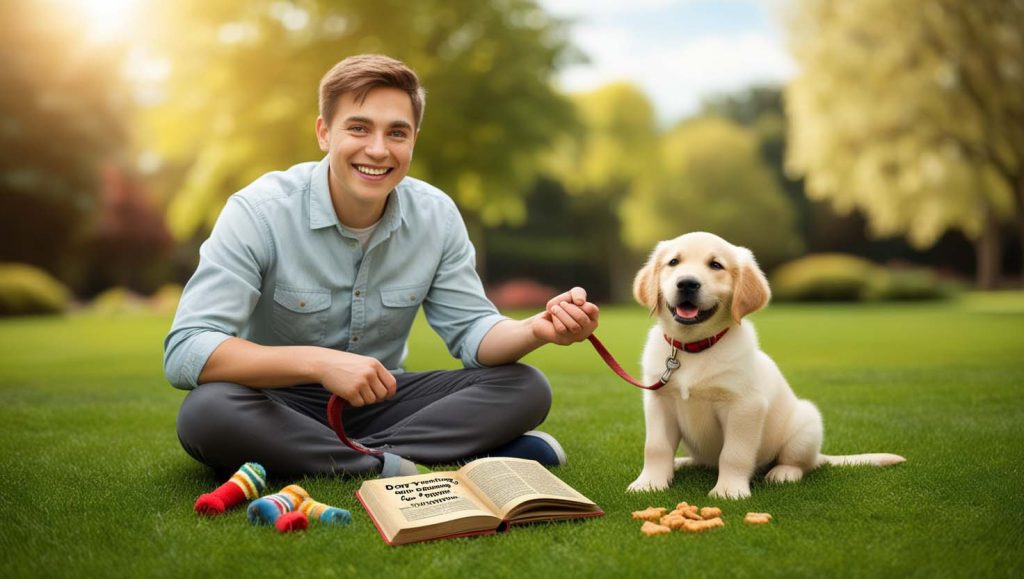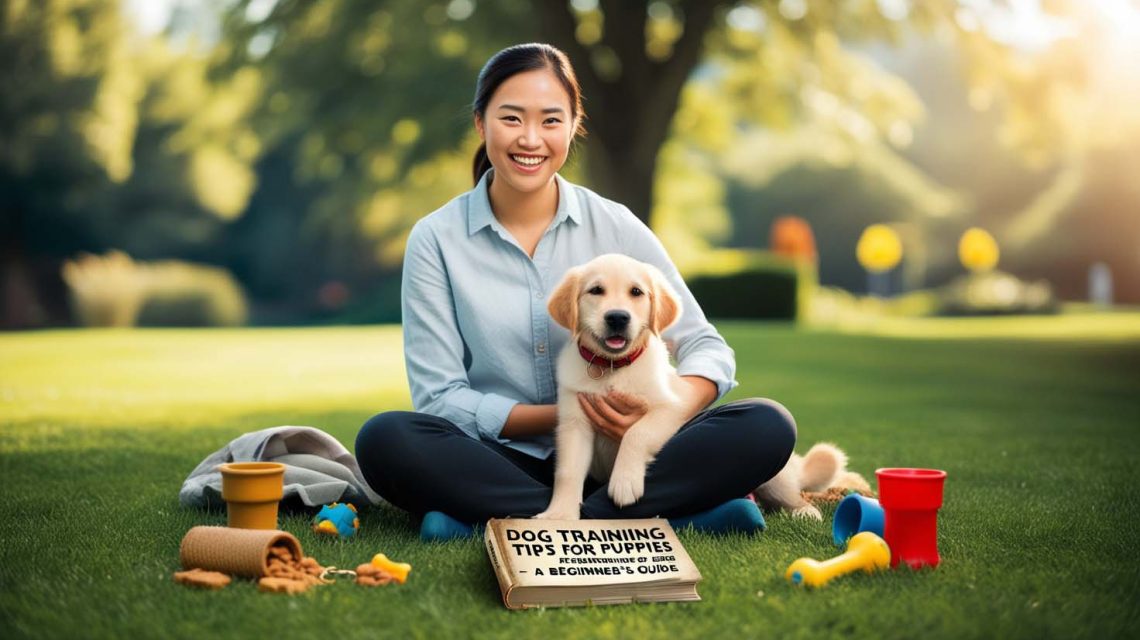Bringing home a new puppy is exciting, but it also comes with responsibilities. Training your puppy early is crucial for building good habits, ensuring they grow into a well-behaved and confident dog. This guide offers essential dog training tips for puppies, covering obedience, housebreaking, and socialization, so you can enjoy a lifelong bond with your furry friend.
Why Start Training Your Puppy Early?
Puppies are most receptive to learning between 8 and 16 weeks of age. This critical period shapes their behavior and sets the foundation for how they’ll interact with you, other pets, and their environment.
The Benefits of Early Training
Starting early prevents behavioral problems like chewing, barking, and leash pulling. It also builds a strong bond between you and your puppy, creating a relationship based on trust and communication.
Laying the Groundwork for Good Behavior
With consistent training, your puppy will learn what’s expected of them, making life easier for both of you. Basic obedience, housebreaking, and socialization during this stage ensure your puppy grows into a happy, well-adjusted adult dog.
1. Establishing a Routine for Your Puppy
Puppies thrive on structure and routine. Setting a schedule for feeding, potty breaks, playtime, and training sessions helps them feel secure and understand their daily expectations.
Setting Feeding Times
Feed your puppy at the same times every day. Regular feeding schedules lead to predictable potty times, making housebreaking much easier.
Scheduling Potty Breaks
Take your puppy outside frequently, especially after meals, naps, and playtime. Use a designated potty spot and praise them immediately when they go. Consistency is key to reducing indoor accidents.
2. Teaching Basic Obedience Commands
Basic commands like “sit,” “stay,” and “come” are essential for a well-behaved dog. Starting obedience training early builds your puppy’s confidence and strengthens your bond.
How to Teach “Sit”
Hold a treat close to your puppy’s nose and slowly move it back over their head. As they follow the treat, their bottom will naturally lower to the ground. Say “sit” and reward them immediately with praise and the treat.
Introducing “Stay” and “Come”
Once your puppy masters “sit,” teach “stay” by holding up your hand and saying “stay.” Gradually increase the time before giving the release word, like “okay.” For “come,” crouch down and call their name excitedly, rewarding them when they approach.
3. Housebreaking Tips for Puppies
Housebreaking is one of the first skills every puppy needs to learn. Patience and consistency are crucial during this process.
Creating a Potty Training Routine
Take your puppy to their potty spot every 1-2 hours and use a consistent command like “go potty.” Puppies have small bladders, so frequent breaks prevent accidents and reinforce good habits.
Handling Accidents Positively
If your puppy has an accident indoors, avoid punishment. Instead, clean the area with an enzymatic cleaner to remove odors and redirect them to the appropriate potty spot. Praise them when they go outside successfully.

4. Socializing Your Puppy with People and Pets
Socialization is essential to prevent fear and aggression. Exposing your puppy to different people, environments, and other animals helps them develop confidence and good manners.
Introducing New Experiences Gradually
Take your puppy on short outings to meet new people and explore different environments. Reward calm behavior with treats and praise, making each experience positive.
Encouraging Safe Interactions
Allow your puppy to interact with other dogs in controlled settings, such as puppy playdates or socialization classes. Monitor interactions closely to ensure all dogs are comfortable and safe.
5. Managing Puppy Biting and Chewing
Puppies explore the world with their mouths, but it’s important to teach them appropriate behaviors to prevent nipping and destructive chewing.
Redirecting Biting to Toys
When your puppy nips, say “ouch” in a high-pitched tone and redirect them to a chew toy. Consistently rewarding them for chewing on appropriate items helps reinforce good behavior.
Preventing Destructive Chewing
Provide plenty of chew toys to satisfy your puppy’s need to chew. Remove valuable or dangerous items from their reach, and supervise them to prevent unwanted chewing.
6. Leash Training Your Puppy
Leash training is a vital skill that ensures safe and enjoyable walks with your puppy. Start training early to teach your puppy to walk calmly beside you.
Getting Comfortable with the Leash
Begin by letting your puppy wear their collar and leash indoors to get used to the sensation. Reward them for staying calm and comfortable.
Teaching Loose-Leash Walking
Encourage your puppy to walk beside you by rewarding them with treats when the leash stays slack. Stop walking if they pull, and resume only when they return to your side. Patience and consistency are key to mastering this skill.
7. Using Positive Reinforcement in Training
Positive reinforcement is the most effective method for training puppies. It strengthens the bond between you and your puppy while encouraging them to repeat good behaviors.
Rewards That Motivate
Find rewards your puppy loves, such as treats, toys, or praise. Use these rewards immediately after they perform the desired behavior to reinforce the connection.
Avoiding Punishment
Punishing your puppy can create fear and confusion. Instead, focus on redirecting unwanted behaviors and rewarding positive ones. A calm, consistent approach fosters trust and confidence.
8. Keeping Training Sessions Short and Fun
Puppies have short attention spans, so keeping training sessions brief and engaging ensures better learning outcomes.
Ideal Session Length
Limit training sessions to 5-10 minutes, repeating multiple times throughout the day. This prevents boredom and keeps your puppy excited about learning.
Incorporating Playtime
Integrate play into training by rewarding your puppy with a quick game of fetch or tug-of-war. Making training fun helps your puppy stay motivated and engaged.
Frequently Asked Questions About Dog Training Tips for Puppies
When should I start training my puppy?
- You can start training as early as 8 weeks old. Puppies are highly receptive to learning at this age.
What’s the most important command to teach first?
- “Sit” is a foundational command that’s easy for puppies to learn and can be used in various situations.
How do I stop my puppy from biting?
- Redirect their biting to a chew toy and reward them for using it. Consistency and patience are key to reducing nipping.
How often should I train my puppy?
- Train your puppy in short sessions several times a day. Frequent practice reinforces learning and helps build good habits.
What’s the best way to socialize a puppy?
- Expose your puppy to new people, environments, and dogs gradually. Keep interactions positive with treats and praise.
Can older puppies still be trained?
- Yes, older puppies can still learn new skills. While younger puppies may adapt faster, patience and consistency work for dogs of any age.


